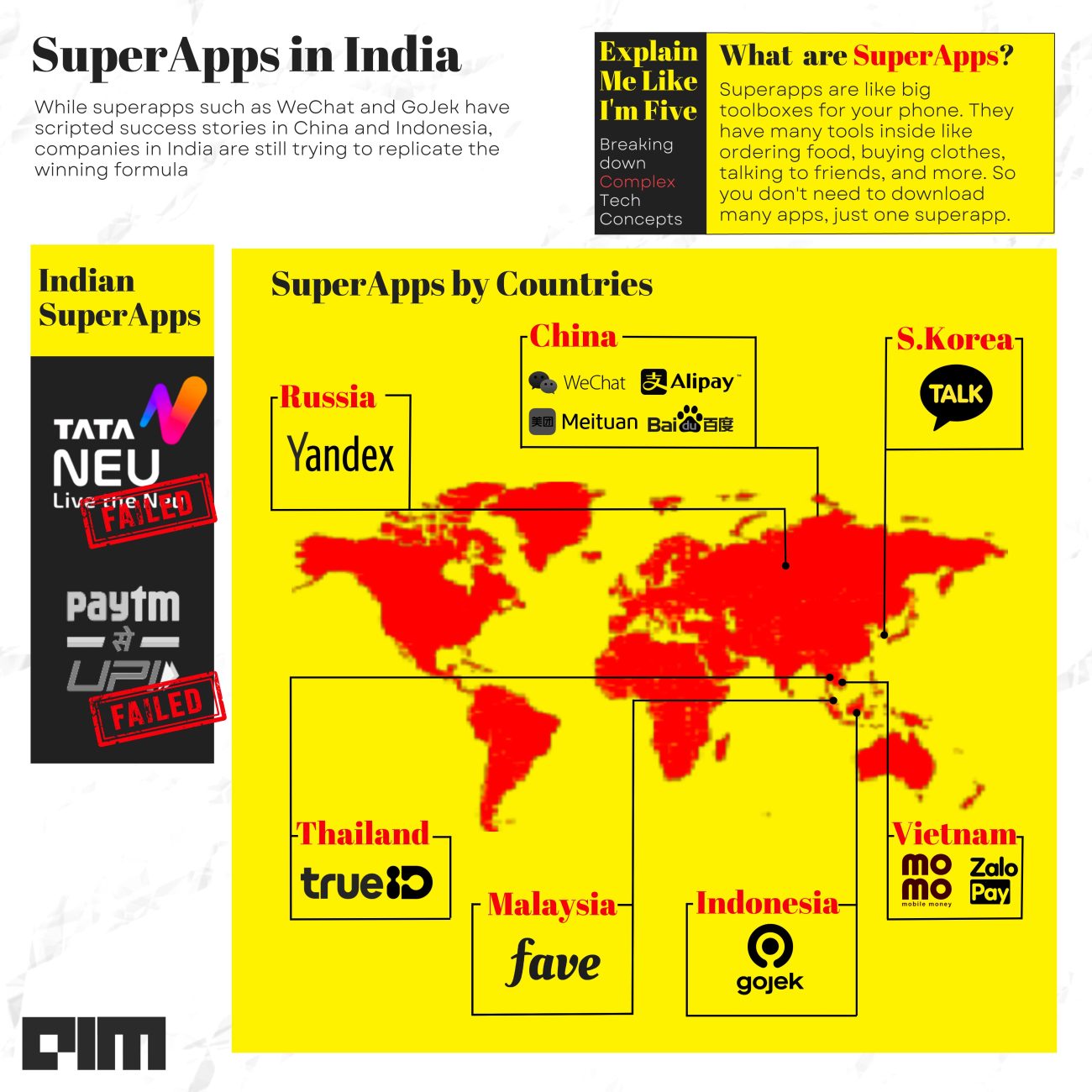|
Listen to this story
|
While superapps such as WeChat and GoJek have scripted success stories in China and Indonesia, companies in India are still trying to replicate the winning formula here. And this is despite the fact that superapp as a concept is not novel.
Paytm, which was launched as a payments wallet in 2010, has become a superapp of sorts with multiple offerings on its platform. However, it has surprisingly failed to scale. Meanwhile, according to projections, Tata Group’s superapp Tata Neu is expected to meet just half its sales target this fiscal year, forcing the company to reevaluate its strategies.
Now, Adani Group is set to launch its own superapp somewhere this year. However, the question that arises is, will superapps ever work in a country like India?
Indian market – a hard nut to crack
According to a Cisco report, India has over 800 million smartphone users, doubling from nearly 400 million in 2017. If we look at the market, it presents opportunities and makes it lucrative for superapp companies.
In terms of user numbers, India is a goldmine for any app-driven business. Integrating services such as food delivery, payments, taxis, tickets and insurance, among others in a single platform and offering an all-inclusive digital experience to consumers seems like a good prospect in the Indian context.
“With a huge working-age population, infiltration of high-speed internet even to rural areas, and inexpensive labour and shipping charges, it makes the perfect environment for apps to develop and succeed,” Pranav Dwivedi, founder of Netratvshaala, told AIM.
Over the years, different players like Hike Messenger, Paytm, Reliance Jio, Amazon, and Ola tried their luck in this space, but none has managed to clone the success of WeChat in China or Gojek in Indonesia. Now, Tata Neu’s misfortunes only reinforces the idea that the Indian market is a hard nut to crack.
Why is Tata Neu failing?
Tata Neu, despite the backing of one of the largest business conglomerates in the world, failed to take off. “Tata Neu encountered difficulty in gaining traction in the Indian market. Late entry, limited services, poor user experience, lack of marketing, and regulatory challenges are all factors that have hampered their progress,” Dwivedi said.
Tata Neu’s performance has been so abysmal that Sauvik Banerjjee, founding member and CTO of Tata Neu, resigned just four months after the app’s launch. “Besides, it only provides a few services, such as e-commerce, ride-hailing, and food delivery, that are already on offer on other apps,” Dwivedi said.
Space domination played a big role in Neu’s failure. For example, e-commerce is heavily hegemonized by Amazon and Flipkart. Similarly, the ride-hailing and food delivery space is controlled by Ola and Uber and Swiggy and Zomato, respectively, making the space practically watertight for Neu to break in.
Further, Dwivedi believes the company did not put much into marketing and advertising, making it inconspicuous to potential customers. “Moreover, to meet the regulatory requirements, Tata Neu has to invest more money and time,” he said.

Challenges for superapps
The prime reason for superapps not taking off in India is the country’s late arrival to the party. There already was intense competition in the Indian market in every space, making things difficult for superapps.
We already have a variety of e-commerce, payments, food delivery, and ride-hailing apps in India, so it can get difficult for a new superapp to gain a foothold in the market.
“Many of these existing apps have well-established customer bases and strong brand recognition,” Dwivedi explained.
In a price-sensitive market like India, the likes of Zomato, GPay and Uber have built a niche for themselves by using discount pricing strategy. In fact, many of them are using the same strategy to stay relevant in the market. However, for a superapp it might not be feasible to offer discounts for all the services they have to offer.
Jack of all trades, master of none
Another concern that Dwivedi points out is the wide spectrum of services that superapps usually propose. “Giving a first-class experience across all these services can be hard, as each requires dissimilar expertise and assets. For example, a significant cause of the failure of Paytm Mart is the poor quality of services and a lack of quality control.”
There are also administrative, and compliance challenges to take into consideration. “For instance, rendering financial services such as mobile payments and banking demands adhering to several regulatory requirements and attaining the requisite certificates. Diverse kinds of permits and regulations are needed to deliver medicine supplies, food, and financial services.”
Today, customers want hyper-personalised and hyper-localised products, and a superapp might not be able to make everyone happy.
Superapps won’t work in India
Kavin Bharti Mittal, founder of Hike Messenger, said since smartphone and data penetration in India is good, users have the ability to download numerous applications on their phones. Mittal, in fact, wanted to turn Hike into a WeChat-like superapp in India. However, Hike Messenger shut down in January, 2021.
Mittal believes a superapp is not what customers in India are looking for, even though businesses are pushing for it. Instead, what customers really want is the best user experience.
Deepinder Goyal, chief executive at Zomato, is also sceptical of the viability of the superapp model in India. “We haven’t seen superapps work in India so far,” he said, while speaking to analysts during the company’s Q4 2022 financial results.
For a superapp to work in India, it must first offer hyper-personalised and hyper-localised user experience and overcome users’ reliance on already existing apps, for example, Swiggy and Zomato, for food delivery.
With Adani Group set to launch its own superapp despite the scepticism and Tata Neu still in the game, it would be interesting to see if these business conglomerates are able to crack the nut.











































































